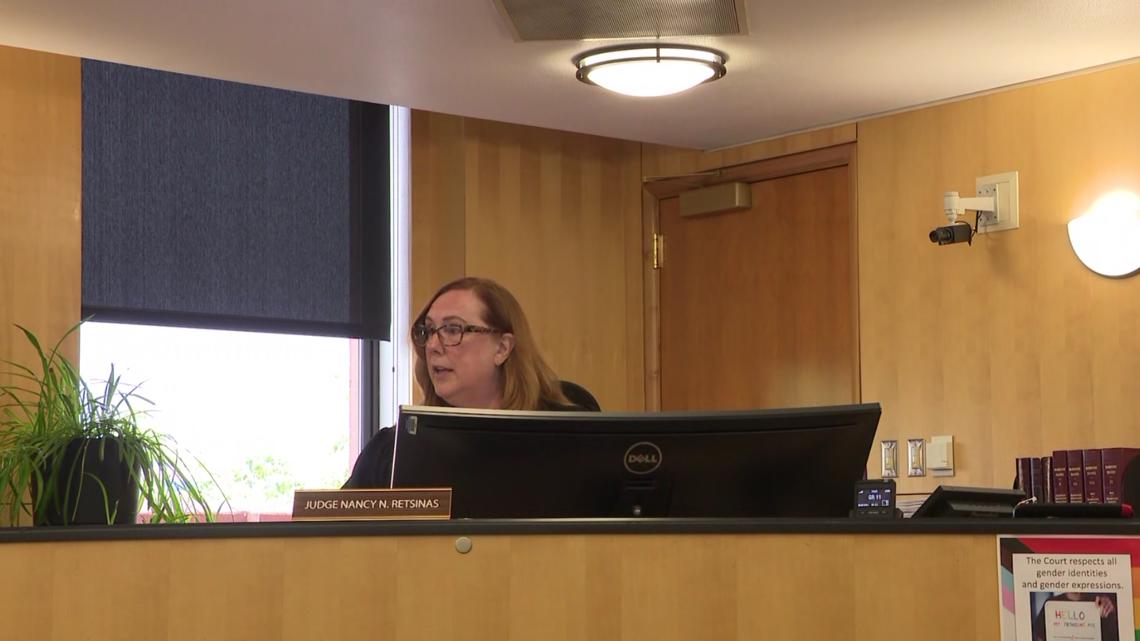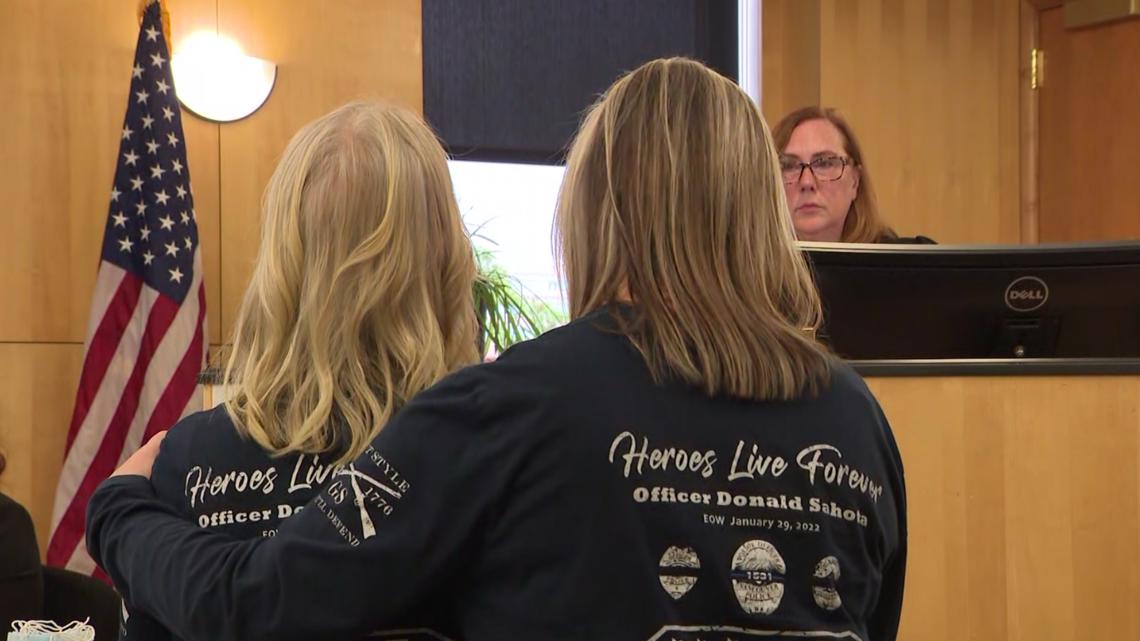VANCOUVER, Wash. — A Clark County judge on Thursday sentenced Julio Segura, 22, to just over 29 years in prison for the death of a Vancouver police officer following a robbery and chaotic attempt to escape pursuing deputies in late January 2022.
Segura was convicted last month on charges of first-degree murder, second-degree murder, robbery, possession of a stolen vehicle and attempting to elude a police vehicle. The Clark County jury found Segura not guilty on the charges of attempted murder, attempted kidnapping and burglary.
The murder charges stem from the death of Vancouver Police Officer Donald Sahota. Segura admitted to stabbing Sahota during a struggle in the officer's driveway, but the county medical examiner concluded that Sahota died from gunshot wounds — the result of a responding Clark County deputy mistaking the officer for the suspect, shooting him multiple times.
The courtroom was packed with dozens of people Thursday as family, friends and fellow law enforcement officers of Officer Sahota awaited the sentence.
Judge Nancy Retsinas began the sentencing hearing by addressing a number of legal concerns brought by Segura's defense team regarding his trial and conviction, including the propriety of a first-degree murder charge in the case, but the judge said she would not be granting any of the defense's motions.
However, Judge Retsinas flagged several of the issues as having potential for an appeals court examination. She also agreed with the defense that Clark County prosecutors' request for life without parole would be inappropriate in the case, saying it would be "an absurd result" to deliver a sentence usually reserved for a case of aggravated murder.


'I don't know who I am without him'
Before the sentencing, Sahota's friends and family had an opportunity to deliver victim impact statements.
In halting, tearful testimony, Sahota's mother detailed how he grew up in a racist environment with an abusive, alcoholic father — how they moved to Washington to escape Sahota's father, and were homeless for months, scraping out a primitive existence.
"Don was my rock," she said.
Sahota, she said, dropped out of school to work and make money for the family; working many odd jobs before he achieved one of his dreams by becoming a police officer.
"As far as sentencing is concerned, I don't think life is long enough," she later said, referring to Segura. "He took my son away from me. I don't think the hole in my heart will ever mend."
Multiple friends and family members testified at length to Sahota's character and how much his absence will have a lasting impact on their lives. They broadly asked that Judge Retsinas deliver the maximum possible sentence for Segura.
"Please send this man to prison for as long as you can," Vancouver Police Sgt. Paul Benton said, reading the words of Sahota's friend, Jason Wilson.
"On January 29, Julio Segura stole him from us. Julio Segura stole Don from this community, and he stole him from our police department," testified Vancouver Police Chief Jeff Mori, pointing his finger at Segura. "I pray every night, when Julio Segura is in jail, that the last thought that goes through his mind is Don Sahota, and upon waking, his first thought is Officer Don Sahota. And your honor, I pray that you offer the maximum sentence for Julio Segura."
Sahota's daughter testified to the way her childhood home was sullied by Segura's actions and her father's murder, and her sense of safety shattered. Her father, she said, never got to meet her child — his first grandchild.
Last to testify was Dawnese Sahota, the officer's wife.
"The last two-and-a-half years have been excruciating," Dawnese Sahota said, momentarily breaking down as she began her statement.


Don and Dawnese Sahota were high school sweethearts. She described him as an extremely capable, caring and dedicated husband and father who worked nonstop to support them. Dawnese said she was diagnosed with breast cancer in 2017, and Don Sahota was there to take care of her every step of the way.
They were preparing for retirement and an opportunity to spend more time together. But that opportunity, and further milestones as a family, were cut short.
"I don't know who I am without him," Dawnese said tearfully, "and I don't want to know who I am without him."
Dawnese said she holds Segura entirely responsible for the death of her husband — and because of him, she lives with a constant fear that threatens to overtake and paralyze her.
"I suffer the fear of that experience every day," she said. "Every time the doorbell rings, I instantly panic."
Like many of the others who testified, Dawnese said that no sentence for Segura would be sufficient to make up for Don Sahota's death.
"I pray that you see that justice is done, and you sentence him to the maximum term allowed," she concluded.
Both the prosecution and the defense each had a chance to make their arguments to the judge about how Segura should be sentenced — and whether he deserved the maximum possible penalty.
Segura himself said that he had a prepared statement but decided not to deliver it after hearing the statements from Sahota's friends and family. Instead, he apologized for the pain he'd caused.
Sentencing
Before delivering the sentence, Judge Retsinas walked through her thinking on whether to take into account any mitigating factors. She felt that there wasn't sufficient evidence of mental illness, youth or hardship in his case to meaningfully factor into the sentence. However, she did reference his "heartbreaking" 1,500-page social services record from when he was a minor, which showed evidence of an abusive and neglectful upbringing.
The adults in Segura's life, Retsinas said, led him further into poor decisions instead of trying to lead him away. She also acknowledged that professionals in his life tried unsuccessfully to intervene, including school officials.
Despite taking that into account, Retsinas declined to deliver a sentence at or near the minimum recommendation.
"He shared deep sorrow, and I believe that’s heartfelt, but I did not hear him speak to remorse for his actions that night," the judge said, adding that Segura expressed remorse solely for the consequences of those actions.
On the first-degree murder charge, Judge Retsinas sentenced Segura to 325 months in prison with a 24-month deadly weapon enhancement, as well as 36 months of post-prison supervision, fines and restitution. Sentences for the other crimes will run concurrently, so they do not add to the overall sentence of just over 29 years.
Segura will not be eligible for parole, but he can get up to 10% of the sentence reduced for good behavior since it is a non-mandatory sentence.
"Julio," Retsinas said in an aside to Segura, "make value of your time, make value of your life. Your life has value."
The judge later reiterated that she expects Segura's attorneys to appeal due to the unusual nature of the case.
After the trial, the Vancouver Police Chief Jeff Mori released a statement, saying, “Today’s sentencing of 29 years in prison for the defendant in the murder of Officer Donald Sahota provides the family and friends Don left behind the opportunity to start healing from what has been an excruciatingly painful 2 ½ years. The Sahota family will remain in our prayers and the memory of Don Sahota and his contributions to the law enforcement profession, his community and the Vancouver Police Department will continue to live on.”
Mori added that the Sahota family is asking for continued privacy.
The trial and conviction
Sahota's death became the primary point of contention during the trial. Segura admitted to stealing a car in Yakima, Wash., before traveling down to Vancouver in January 2022. He then robbed a convenience store and led responding deputies on a chase that ended near Sahota's Battle Ground home.
Ditching the stolen car, Segura knocked on the door of Sahota's home while the officer and his wife were having dinner together. After answering the door, Sahota seemed to have realized something was wrong and tried to detain Segura with his gun drawn.
"I remember my husband saying that he was an officer and attempting to detain him," testified Sahota's wife, Dawnese.
During his testimony, Segura said that he fought back because he did not realize Sahota was a police officer, contradicting Dawnese Sahota's testimony. While he said Officer Sahota said the word "police," Segura suggested he understood it as a reference to the sound of sirens fast approaching. He testified that he felt he was fighting for his life.
After stabbing Sahota multiple times with a knife, delivering grievous wounds, Segura broke away and ran into the Sahota home through the open front door.
Aerial video provided by investigators showed that as Segura ran into the home, Sahota was getting to his feet, picking up his gun which had fallen to the ground during the struggle. He started to run after Segura just as the first Clark County deputy arrived on the scene, drew his own gun and opened fire — hitting Sahota and ultimately killing him.
During the trial, Judge Nancy Retsinas dismissed two of three murder charges against Segura before closing arguments were set to begin. The two charges relied upon an assumption that Segura running into the Sahota home constituted burglary and attempted kidnapping — two charges on which Segura was later acquitted — and that the responding deputies knew as much.
But the jury did convict Segura on multiple felony charges, including the most serious: first-degree murder. Despite the fact that Segura's knife wounds were not the immediate medical reason for Sahota's death, Washington's murder statute provides for circumstances under which someone might be responsible for causing a death regardless.
The law states that someone commits first-degree murder when, "Under circumstances manifesting an extreme indifference to human life, he or she engages in conduct which creates a grave risk of death to any person, and thereby causes the death of a person," or "He or she commits or attempts to commit the crime of ... robbery in the first or second degree ... and in the course of or in furtherance of such crime or in immediate flight therefrom, he or she, or another participant, causes the death of a person other than one of the participants."
The Clark County deputy who shot Sahota, John Feller, was not charged in connection with the case by the county district attorney. An independent panel of prosecutors that examined the case was unable to reach a consensus on whether Feller acted in "good faith" when he opened fire that night.